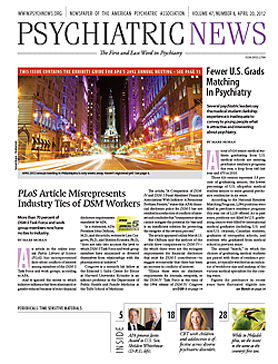This year’s match results, in which the number of U.S. seniors choosing psychiatry residencies dropped from 640 last year to 616, has generated discussion among leaders and members of the American Association of Directors of Psychiatric Residency Training (AADPRT).
Sandra DeJong, M.D., chair of the recruitment committee for AADPRT, told Psychiatric News that the downward trend for psychiatry likely stems from a combination of factors including continuing stigma about psychiatry and mental illness among medical students, concerns about the uncertainty around health care reform and its impact on psychiatry, and the carveout of reimbursement for psychiatric treatment from that for general medical treatment. Moreover, she added, psychiatry has not done the best job promoting itself.
“Clearly there is not a lot of medical student interest in psychiatry early on, and it diminishes when students go to apply for residencies,” she said.
DeJong told Psychiatric News that recruitment into the profession is a problem for the international community and that the World Psychiatric Association is studying barriers to recruitment.
Steven Schlozman, M.D., who is codirector for medical student education in psychiatry at Harvard Medical School and a training director in child and adolescent psychiatry at Massachusetts General Hospital, posted extensive comments about recruitment on the AADPRT list serve that he agreed to share with Psychiatric News.
“We know that even among students who say they are ‘very interested’ or ‘interested in psychiatry’ and who have relatively stable opinions with regard to that question throughout medical school, a surprisingly low percentage choose psychiatry,” Schlozman wrote. “When asked why they don’t, they cite the opinion of peers and of other non-psychiatric doctors” as inhibiting factors.
He added that students themselves glean from the carveout psychiatric payment system that “there must be something off or less valid about psychiatry.”
Among those students who tend to both like and choose psychiatry, Schlozman said the following traits stand out:
A positive experience with psychiatric treatment (often psychotherapy)
An interest in the humanities
Someone in the family with significant psychiatric illness
A positive experience on the clerkship
Clerkship experience long enough to demonstrate change in patients
Schlozman said there is some evidence to suggest that an ambulatory or consultation-liaison experience can create enthusiasm for psychiatry more than the traditional inpatient experience can. “There are also suggestions that having psychiatrists as core members of medical school leadership and on curriculum planning helps,” he said.
Schlozman added, “We know that medical students very much dislike the strength with which we express our disdain for one another in our field. The literature suggests that when medical students hear one psychiatrist directly criticizing another aspect of what is traditionally thought of as psychiatry, the students are very turned off.”
But Schlozman said there is a great opportunity for recruitment into psychiatry. “If you ever have the pleasure of reading the essays students write to get into medical school, you’ll note that … they all want lasting relationships with patients,” he said. “This ought to be a slam dunk in recruiting to psychiatry if students really want this and if we could remove the preconceptions about our field. Psychiatry offers a near bullseye for this generation of students who desire to be with their patients in lasting ways.”

